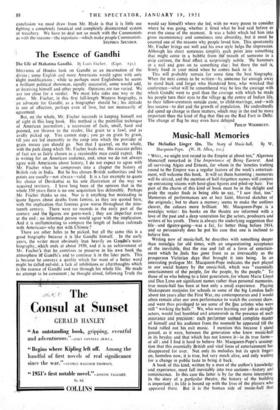The Essence of Gandhi
The Life of Mahatma Gandhi. By Louis Fischer. (Cape. 2Ss.) MILLIONS of Hindus look on Gandhi as an incarnation of the divine ; some English and more Americans would agree with only slight modifications ; while to perhaps most Englishmen he seems a brilliant political showman, equally successful, some would add, at decek ing himself and other people. Opinions are too varied. We are too close for a verdict. We must take sides one way or the other. Mr. Fischer, in this first full-length Western biography, is an advocate for Gandhi, as a biographer should be ; his attitude is one of affection, perhaps even of love, but not necessarily of agreement. But, on the whole, Mr. Fischer succeeds in keeping himself out pf sight in this long book. His method is the pointillist technique of American journalism ; a succession of facts, small, hard and pointed, are thrown to the reader, like grain to a fowl, and as avidly picked up. You cannot stop ; you go on grain by grain, till you are led insensibly to the coop into which the provider of grain means you should go. Not that I quarrel, on the whole, with the path along which Mr. Fischer leads me. His staccato pellets of fact are as fairly chosen as a reasonable man could expect. He is writing for an American audience, and, since we do not always agree with Americans about history, I do not expect to agree with
• Mr. Fischer when he compresses into a chapter the history of British rule in India. But he has chosen British authorities and his pcints are usually—not always—valid. It is a fair example to quote his choice of Devikottai as his sole illustration of the way we acquired territory. I have long been of the opinion that in the whole 350 years there is no one acquisition less defensible. Perhaps Mr. Fischer thinks so too. Nor is it anything but misleading to :quote "figures about deaths from famine, as they are quoted here, with the implication that famines grew worse throughout the nine- teenth century. There were no records in the early part of the century and the figures are guess-work ; they are imperfect even at the end ; no informed person would agree with the Implication. And it is unilluminating to compare the length of Indian railroads with American.--why not with Chinese ? There are other holes to be picked, but all the same this is a good biography because it is like Gandhi himself. In the early years, the writer must obviously lean heavily on Ganiihi's %auto- biography,.Which ends at about 1930, and it is an achievement of Mr. Fischet's that he contrives to preserve in his own book the atmosphere ef Gandhi's and to continue it in the later parts. This is because he conveys a quality which for want of a better word might be called naivete, a lack of inhibitions or afterthoughts which is the essence of Gandhi and ran through his whole life. He made no attempt to be consistent ; he thought aloud, following Truth (he
would say himself) where she led, with no wary pause to consider where he was going, whether it fitted what he had said before or even the cause of the moment. It was a habit which led him into gross inconsistency and sometimes into absurdity, but it must be counted one of the reasons why people loved him. This spontaneity Mr. Fischer brings out well and his own style helps the impression. Although his short sentences simplify each point into something that might come in a bubble from thee' mouth of someone in a strip cartoon, the final effect is surprisingly subtle. He hammers in a nail and goes on to something else ; but there the nail is, firmly fixed in your mind when he comes back to it.
This will probably remain for some time the best biography. When the next comes to be written—by someone far enough away to stand back and forget who blundered here, who wrecked that conference—what will be remembered may be less the courage with which Gandhi went to gaol than the courage with which he made his people turn their eyes to the village a the centre of Indian life, to their fellow-creatures outside caste, to child-marriage, and—with less success—to diet and the growth of population. He undoubtedly did speed up change in these matters, which may in the end be more important than the kind of flag that flies• on the Red Fort io Delhi. The change of flag he may even have delayed.
PHILIP WOODRUFF.


































 Previous page
Previous page